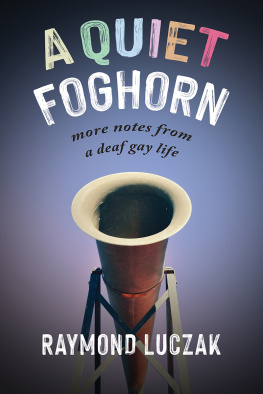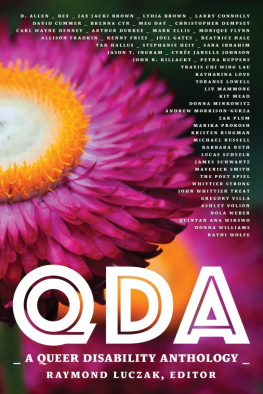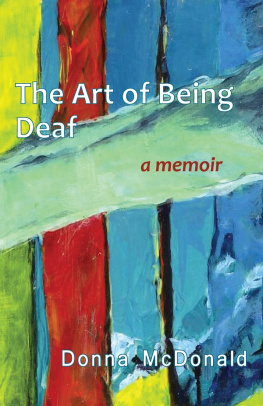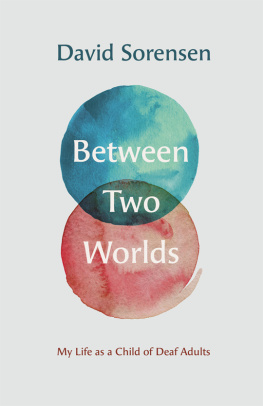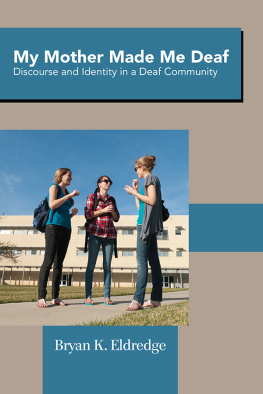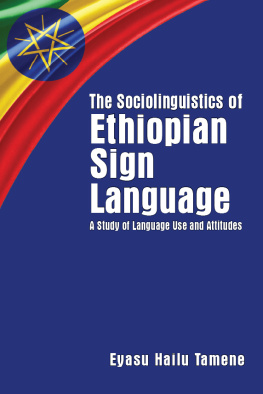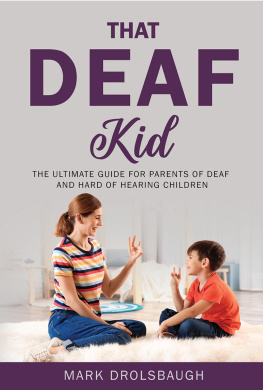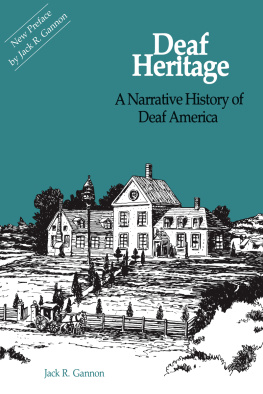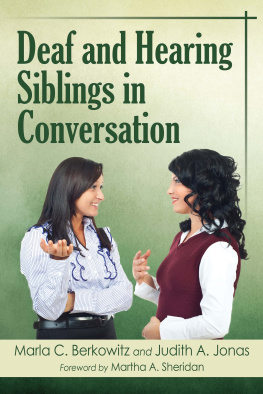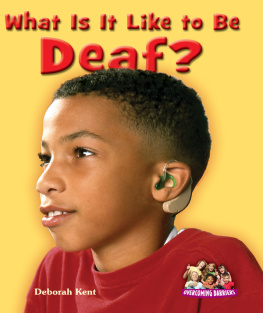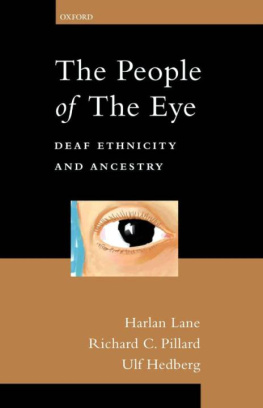A QUIET FOGHORN
Everyone knew I was different the second I opened my mouth and made a sound. The second before I had looked like them: I had a perfectly formed mouth and a set of good teeth.
I speak through my nose. Theres a reason for that. Many deaf children, when they learn how to speak, cannot sense the physical relationship between lungs inside the ribcage and the weird sounds that they are asked to produce. Speech therapists go for the next best thing, which is to focus on the throat where sounds can be easily felt. They get more discernible results that way.
For years, I used to hate the sound of my voice.
I didnt want to see how hearing peoples eyes flickered ever so slightly the second they heard me speak.
I didnt want to see how they tried not to look more closely at the earmolds inside my ears.
I didnt want to see how they tried to hide their discomfort with my make-do speech.
I have been seen as a freak for so long that Ive become numb to such subtle shifts in behavior.
But is being numb a good thing?
Perhaps its a good survival mechanism while young and lost in a world that didnt always make sense from a childs perspective.
The older I get, the less patient I am with pretending to be nice. I am tired of feeling numb. I speak up more and demand eye contact. I find myself feeling more emotions far more quickly than I ever did as a child.
Being deaf, I cannot fully hear myself. I do not know what I truly sound like, or whether all the intended sounds in my speech are fully formed. Many of my consonants are missing. But I have always wanted to be a singer, more so when MTV flourished during the Golden Age of Music Videos circa the first half of the 1980s. The singers around whom cameras revolved had all the attention. Nearly naked women fawned over skinny men with permed mullets as they lip-synched to their latest hit. Occasionally, a coterie of tuxedoed men would center around a female singer, like Madonna in the Material Girl video, where she infamously paid tribute to Marilyn Monroe, but that was rare.
As a budding deaf homosexual, I sensed that it was taboo to have a group of men interested in a woman, but it was totally natural to have a group of near-naked women prancing about in front of the cameras. I never questioned the nature of these things; I was too afraid to ask why there werent more men in the music videos.
I watched for the men anyway.
In the video for Olivia Newton-Johns massive hit Physical, she coyly walked through an all-male gym. Here and there, I caught a sly glance of desire between men while she shrugged it off with a boys-will-always-be-boys look. I had to wonder whether it was indeed possible for bodybuilders to be physically interested in each other.
Some textbooks say that adolescence is a time of constant questioning. I questioned the changes in my body every day in front of the bathroom mirror. Here I was, all of 511 and 126 pounds. My pectorals were flat, and I didnt have much of an ass. The sensation of peach fuzz soon turning to darker and stiffer hairs on my jaw did not lose its strangeness for the longest time. The sprouting of chest hair and the sharp tang of my underarms didnt help matters.
But worse were the pimples that dotted like weeds all over my freckled face. I came to hate them because no matter how gingerly I coaxed out the sebum, it left behind a hint of blood that took a day or two to heal. By then, other pimples popped up elsewhere. I envied my hearing classmates who didnt seem to have acne, and those who did seemed to have minor zits that soon vanished.
I observed them all each day in the classroom. I hungered to touch the muscles of these young men bursting with braggadocio, but I knew it was hopeless. If I was too afraid to touch myself in the same way I ached to touch another mans body, how could I possibly hope to touch another?
There is a certain power to be gleaned from stillness. I had to sit still in the classroom and not move while lipreading for hours. I had to work to understand. I sometimes resented how hearing classmates could doodle on their notebook margins without once looking up at the teacher.
Why not me? Why couldnt I look cool with my wireless hearing aid? In those days my hearing teachers wore a bulky microphone around their necks to enable me to hear their voices more clearly. Looking cool was impossible.
And yet, thanks to my hands, Ive learned the greater power of silence. Hearing people who dont know how to sign are forced to look more closely at me, trying to glean meanings from my hands. Their eyes dart all over the place.
Out in the woods, across the street from the house where I grew up, I made percussive sounds with the clicking of my tongue and the sharp hums of my throat. Sometimes I tried singing in a nasal falsetto, which Im sure sounded awful to any hearing person, but to me, I felt a private joy in deluding myself that I was indeed a pop singer in the making.
The pop star thing never happened. I became a quiet foghorn instead.
MY TRUEST HOME
I remember Mom waking me gently, and then firmly, at five in the morning, to bundle up for our annual trip from Ironwood to Marquette, where Id undergo an audiological exam at Northern Michigan University to determine whether my hearing over the past year had changed or not. The trip usually took three hours under good weather conditions, but it was January, and that meant we had to think about the patches of ice on the highway.
Once sealed inside the soundproof room and observed through layers of murky gray-tinted windows by the audiologist, I raised my hand whenever I thought Id detected the faintest murmur of sound in my headphones. I also repeated what I could comprehend: Say the word airplane. Say the word cowboy. Say the word hot dog.
The whole trip was bearable because I could be alone with Mom for a long period of time without interruption from my eight siblings. The closeness Id felt toward her was most apparent on those occasions whenever I sensed she wanted to be away from everyone for a while. Our visits to Marquette were among her chances to be free for a day; she almost never had a break from us.
Because I was the only deaf student in Ironwood, my parents decided that it was best for me to attend a speech program for deaf students from all over the western Upper Peninsula in Houghton, a two-hour ride away. Starting at age four, I stayed with a foster family from Sunday nights to Friday afternoon, when a college student in Houghton would pick me up at school and drive me home to my biological family.
Even though I traveled back to Ironwood on Friday nights and to Houghton on Sunday nights, I never considered the road a part of me until those moments on our way to Marquette for my annual audiological exam when I saw how Mom enjoyed herself, talking with the driver and his other passengers in his station wagon. Did she really like the road? I simply saw it as a way back home, but shuttling between families for a total of nine years meant that the word home would acquire a nebulous meaning.
Mom has always maintained that no one would ever confirm how Id lost so much of my hearing. As such, Ive always dated my deafness from the last possible causea bout of double pneumoniaat the age of eight months. She has recounted many times howin the middle of a notorious heat waveshe noticed how feverish Id become, and how she and Dad had thought Id die. The day was July 9, 1966: I think of it as the first, and probably the most crucial, turning point of my life.
My sister Carole noticed that something was amiss after I returned from the hospital. She liked to read out loud to me in the crib; I had always been keen to listen to what shed say next. Now I didnt seem to respond to her voice at all. But it was not until I was two and a half years old when my parents finally conceded that something was indeed wrong. Before I knew it, a huge hearing aid was strapped to my tiny chest.
Next page
